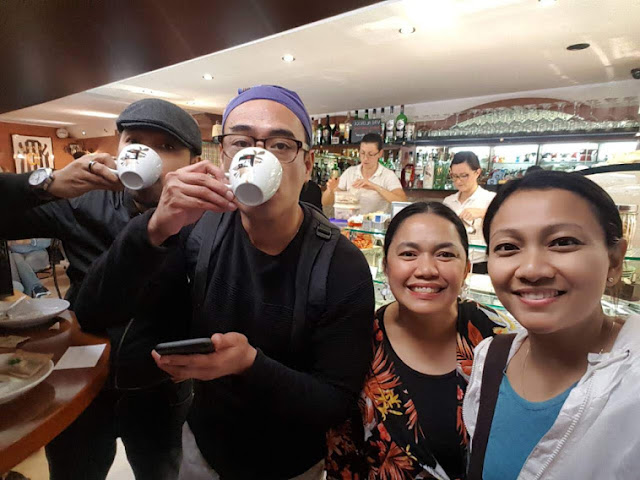 |
| "Your suffering, your struggle and your death should not be in vain" |
Sunlight peeked out of wispy-thin clouds in a vast azure sky the day we went to Neuengamme. The bus ride was a little long (longer than usual, at least), but the green fields and charming suburban houses on the outskirts of Hamburg made the journey bearable, even fun. The group was in good spirits: a field trip to a visit a historical landmark was a welcome change of pace after days of lectures inside the Elsa Brandstrom house.
But the mood quickly shifted when we arrived at our destination. Raucous laughter and idle chatter among the Summer Academy participants were replaced by a hushed reverence as soon as we stepped into the box-shaped building in one corner of a small grassy field. It was the museum that housed a list of the victims of the concentration camp Neuengamme during World War 2. The names were written on gigantic scrolls that hung floor to ceiling around the four walls. The museum guide announced that not all who perished in the concentration camp were on the list: it was impossible to track down and identify everyone who suffered and died after passing through the horrors of Neuengamme.
 |
| The memorial was meant to look like a furnace chimney. You figure out why |
Almost 100,000 people were held at the concentration camp from 1938 until the end of the war in 1945. They were held mostly for their religious and political beliefs: Jehovah’s Witnesses, Jews, communists, dissidents, homosexuals and other minorities the Nazi deemed “undesirable.” Forced to undergo hard labor in the most punishing conditions, about 55,000 inmates never made it out of there alive.
My familiarity with the events of World War Two, particularly the Holocaust, are limited to films like “Schindler’s List,” television shows, books and online material. The information is both fascinating and sickening: there are no words to describe the incredibly heinous acts committed by the Nazis, particularly the Schutzstaffel or SS, against their fellow human beings. But to actually see the place were those crimes were perpetrated, to walk in the same grounds where thousands of people were whipped and beaten and perhaps even shot to death, to actually be in the midst of all that pain and anguish all those years ago, I couldn’t help but be overcome by a wave of sadness. We learned history from the books at school, but absolutely nothing can prepare us when history (especially of the unbearable, horrific kind) is right there in front of us.
 |
| A sculpture meant to symbolize the loss of all hope |
Outside, a tall monument stood next to a sculpture shaped like a human lying on the ground. Its body twisted in an odd angle and shape, the sculpture represents the suffering of the inmates of the concentration camp. Our guide said the artist captures the exact moment when the person loses all hope and surrenders his or herself to his fate. It is a heartbreaking sight, and it is an image that will remain with me for years to come.
We took a quick tour of the victims’ exhibition in one of the buildings on the grounds. Their stories might be different, but they all shared the experience of being subjected to one of the worst atrocities committed by man the world has ever seen. Seeing their living conditions, what they wore and how they were treated only intensified the feeling of loss and despair. The sun was still shining brightly as we turned our back on Neuengamme, but a cloud of grief hung over our collective heads. It was a difficult visit, but one that anyone needs to make in any attempt to understand one of the darkest chapters ever in human history.


































